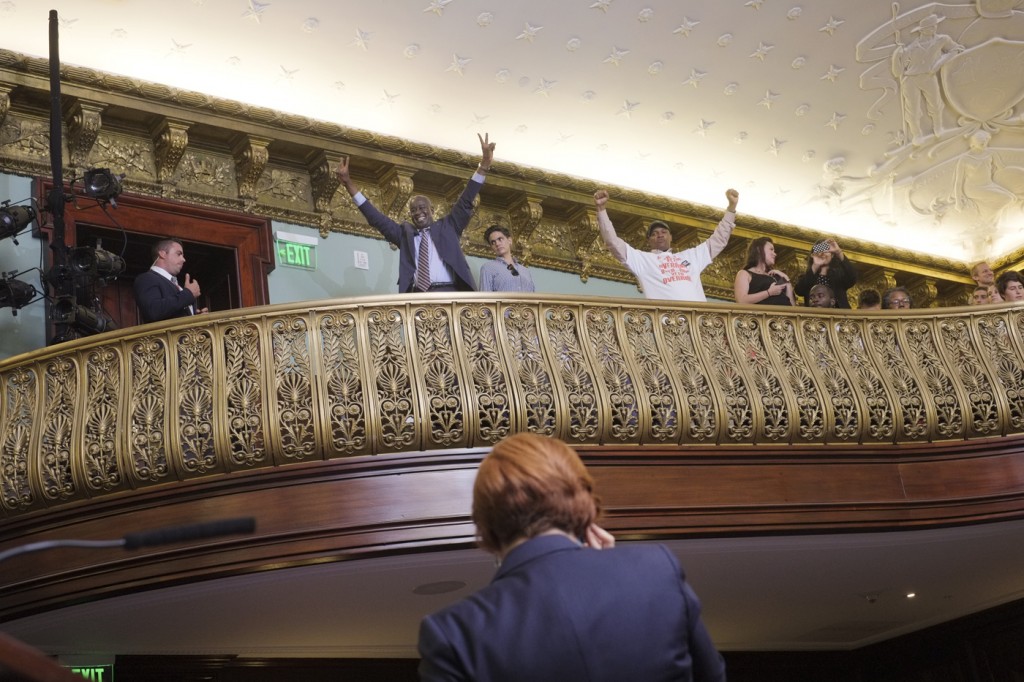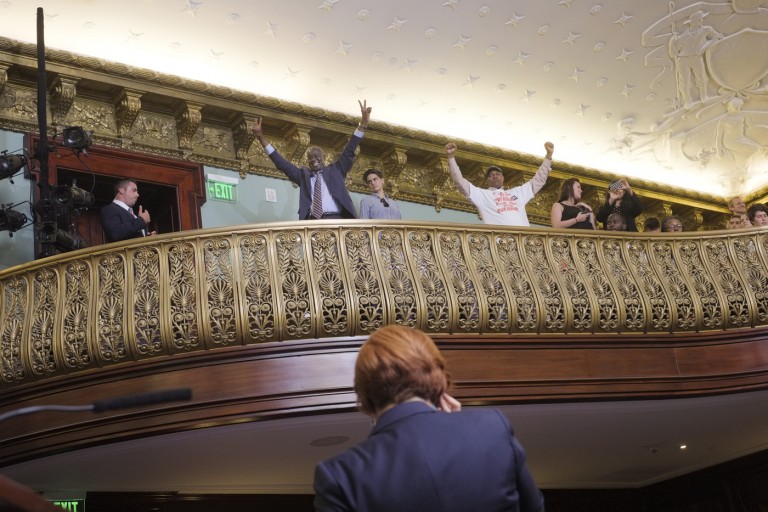
Onlookers cheer after the City Council voted to override Mayor Bloomberg’s veto of the Community Safety Act. A number of legislators and civic leaders in Queens, however, are not happy with the legislation, saying they fear it will result in an increase in crime. Photo Courtesy William Alatriste/NYC Council
The City Council voted last week to override Mayor Bloomberg’s veto of two bills that create an NYPD inspector general and allow individuals to sue for changes to the police department over perceived racial profiling by cops – a move that landed both criticism and praise from Queens legislators and civic leaders.
The Council gave its stamp of approval, by a vote of 39-10 last Thursday, to push through the legislation that creates an independent monitor who will oversee the NYPD, and they voted 34-15 to override the veto on racial profiling. The mayor, who vetoed the two bills that together make up what is known as the Community Safety Act in late July, said his administration has “zero tolerance for racial profiling” and slammed the Council’s vote as “aimed at winning votes.
“It’s a dangerous piece of legislation, and we will ask the courts to step in before innocent people are harmed,” he said in a statement following last week’s vote.
City legislators passed the legislation in response to controversy surrounding the NYPD’s stop-and-frisk program that Bloomberg and Police Commissioner Ray Kelly have hailed as necessary to reduce crime and remove guns from the street, but which critics have said unfairly targets minorities and does not yield high rates of confiscated weapons. Stop-and-frisk incidents have increased from 97,296 stops in 2002 to 685,724 stops in 2011, and black and Latino New Yorkers made up close to 90 percent of those stopped between 2002 and 2011, according to the New York Civil Liberties Union. The NYPD seized 780 guns in 2011, compared to 604 guns during 160,851 stops in 2003, according to the NYCLU.
Bloomberg and Kelly, meanwhile, have stressed that stop-and-frisk has resulted in removing 8,000 guns from the streets over the past decade, in addition to 80,000 “other weapons.” After a federal judge ruled the stop-and-frisk program to be unconstitutional earlier this month, the mayor said at a press conference that the tactic “has saved countless lives.
“And we know that most of the lives saved, based on the statistics, have been black and Hispanic young men,” Bloomberg said. “It’s worth remembering that as recently as 1990, New York City averaged more than six murders a day. Today, we’ve driven that down to less than one murder a day.”
During last week’s vote, the inspector general legislation landed the thumbs-up from Council members Leroy Comrie (D-St. Albans), Daniel Dromm (D-Jackson Heights), Julissa Ferreras (D-East Elmhurst) Karen Koslowitz (D-Forest Hills), Donovan Richards (D-Laurelton), Jimmy Van Bramer (D-Sunnyside), Mark Weprin (D-Oakland Gardens), and Ruben Wills (D-Jamaica). Council members Elizabeth Crowley (D-Middle Village), James Gennaro (D-Fresh Meadows), Peter Koo (D-Flushing) and Eric Ulrich (R-Ozone Park) voted against it.
“Quite frankly, I find this bill to be absurd,” Ulrich said at City Hall last week. “It’s an unnecessary waste of money. We got the financial impact statement – $1.9 million, $2 million, a year to hire somebody that we don’t need when we could be using that money to hire more cops to make people safer.”
All those who voted against overriding the veto on the inspector general bill did so again for the racial profiling legislation, as did Koslowitz – the only Queens legislator to split her vote. Echoing a number of police who spoke to this paper anonymously, Koslowitz said she worried the bill that allows residents to sue over stop-and-frisk would deter police from responding to situations.
“I don’t want to see something that could be detrimental to the city,” Koslowitz said. “I don’t want to see a rise in crime. We’ve been fortunate to have a big decrease in crime.”
The Forest Hills legislator said she voted for the inspector general in part because of her own experience after her son was stopped and frisked twice – once in the 1990s and another time about a year and a half ago.
“I tried to find out why they stopped him, but I’m still waiting for an answer from the 90s and I’m still waiting for an answer to the last time,” Koslowitz said.
Crowley too said she feels the legislation is dangerous.
“She spoke before she cast the vote and reiterated her point that this bill will harm the police’s ability to keep us safe,” said Crowley spokesman Eric Yun.
Other Queens legislators disagreed, saying ensuring the bills became law – which will go into effect as of Jan. 1 – will help to address longstanding tension between communities of color and the police, among other issues.
“I have no choice but to vote what I believe in my heart,” Weprin said. “I feel very strongly that this is a problem that needs to be addressed. This is a policy that needs to be reformed.”
Comrie said that “by reforming this policy, these residents will be less likely to second-guess a police officer’s intentions and be more willing to help them in their investigation.”
But some Queens civic leaders agreed with legislators who voted with the mayor, saying the act will severely constrain cops’ ability to the do their job.
“The laws that passed the City Council are going to handcuff the police,” said Ed Wendell, president of the Woodhaven Residents’ Block Association – which works closely with the 102nd Precinct. “By abandoning procedures that are working, they are going to put all of us in danger.”
Juniper Park Civic Association President Bob Holden said he strongly identified with Ulrich’s statement.
“We all fear that it’ll tie the hands of police officers and could bring back the bad old days that we remember in the 1980s and 90s of higher crime,” said Holden, whose organization works hand-in-hand with the 104th Precinct. “The meddling City Council can certainly mess things up, and it looks like they have. Only time will tell the impact of this.”
By Anna Gustafson

